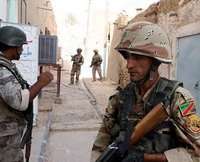B36 News - 29 July 2006
Before I get into the news from Iraq today, I'd like to start with a bit of personal news. Over the next two weeks I'll be sort of touring Iraq and won't necessarily be able to make daily posts for the news. Never fear though, I'll have a travel companion, the Wiz. The Wiz and I will be making our way through Iraq and will take a lot of pictures on the way.
And now, on with the good news!
33 AIF KIA, 0 ISF or CF K/WIA
If you understand the headline, then congratulations, you speak Armyese. We in the military love our acronyms. If you don't understand the headline, allow me to translate: During recent combat operations, Iraqi Security Forces supported by Coalition Forces killed 33 Anti-Iraqi Forces and suffered no killed or wounded themselves.
 Innocent Iraqi Orphans Get Gifts
Innocent Iraqi Orphans Get Gifts
After finding out that there was an orphanage in the area, troopers from the 172nd Stryker Brigade Combat Team arranged for school supplies, stuffed animals, and soccer balls to be delivered so they could hand them out during one of their routine patrols. As is pointed out in the full story, teaching the children that we're trying to help them is of immense benefit to everyone involved since these kids will be the ones running the country in the next 20 or so years.
 Example of Progress
Example of Progress
I talk a lot about the large scale progress and use statistics to show trends in attacks. This story is an example of what those numbers really mean, what they translate to on the ground. Shortly after taking out a terror cell in Mosul, Marines operating in the area noticed a sharp drop in the number of attacks. Combine this with the steady progress being made by the ISF in the region and you're witness to a whole lot of progress.
And now, on with the good news!
33 AIF KIA, 0 ISF or CF K/WIA
If you understand the headline, then congratulations, you speak Armyese. We in the military love our acronyms. If you don't understand the headline, allow me to translate: During recent combat operations, Iraqi Security Forces supported by Coalition Forces killed 33 Anti-Iraqi Forces and suffered no killed or wounded themselves.
- AIF = Anti-Iraqi Forces (bad guys)
- ISF = Iraqi Security Forces (good guys)
- CF = Coalition Forces (us guys)
- KIA = Killed in Action
- WIA = Wounded in Action
 Innocent Iraqi Orphans Get Gifts
Innocent Iraqi Orphans Get GiftsAfter finding out that there was an orphanage in the area, troopers from the 172nd Stryker Brigade Combat Team arranged for school supplies, stuffed animals, and soccer balls to be delivered so they could hand them out during one of their routine patrols. As is pointed out in the full story, teaching the children that we're trying to help them is of immense benefit to everyone involved since these kids will be the ones running the country in the next 20 or so years.
 Example of Progress
Example of ProgressI talk a lot about the large scale progress and use statistics to show trends in attacks. This story is an example of what those numbers really mean, what they translate to on the ground. Shortly after taking out a terror cell in Mosul, Marines operating in the area noticed a sharp drop in the number of attacks. Combine this with the steady progress being made by the ISF in the region and you're witness to a whole lot of progress.
“The [ISF] are in the front of patrols and are moving through the city with a sense of confidence,” said Suleiman, 26, a native of Kearney, Neb. “They are making the decisions during the patrols and are not looking back at the Marines for that nod of approval like they used to.”
(full story by SGT Roe Seigle posted in comments)




1 Comments:
by Sgt. Roe F. Seigle
Regimental Combat Team-7, 1st Marine Division Public Affairs
HAQLANIYAH, Iraq – Marines here say the amount of insurgent attacks against Coalition and Iraqi military forces have drastically decreased since three Marines eliminated two insurgents in a counterattack in front of the forward operating base here last month.
Marines assigned to the Hawaii-based Kilo Company, 3rd Battalion, 3rd Marine Regiment said the outcome of the counterattack sent a message to the insurgents: they will be outgunned and overpowered in a firefight with Marines and Iraqi soldiers.
Marines have spent the past four months patrolling the dusty streets of Haqlaniyah – a city of 30,000 just south of Haditha in western Al Anbar Province – to disrupt insurgent activity and provide security for the city’s residents.
In the past few weeks, Iraqi soldiers – who are partnered with 3rd Battalion – began spearheading daily patrols throughout the city, which Marines say was once a breeding ground for the insurgency.
Just six weeks ago, Marines led the patrols, outnumbering their Iraqi counterparts each time they stepped “outside the wire.” Now, the Iraqis outnumber the Marines, and make all tactical decisions during each mission – a stark contrast from when the Marines arrived in Iraq four months ago.
“The progress the soldiers are making is outstanding because they have done it in such a short amount of time,” said 1st Sgt. Vincent Santiago, 35, Kilo Company’s senior enlisted advisor. “The insurgents are noticing the progress the soldiers are making and I believe it is scaring them (insurgents) because there have been very few attacks in the last month.”
Moreover, the frequency of Iraqi soldier-led patrols in this city nestled along the Euphrates River has increased two-fold in recent months.
By year’s end, the soldiers will be able to lead patrols without the assistance of the Marines, said Sgt. Mennen Suleiman, non-commissioned officer in charge of Kilo Company’s Military Transition Team – groups of U.S. service members responsible for mentoring and assisting Iraqi Security Forces towards independent operations.
“The soldiers are in the front of patrols and are moving through the city with a sense of confidence,” said Suleiman, 26, a native of Kearney, Neb. “They are making the decisions during the patrols and are not looking back at the Marines for that nod of approval like they used to.”
Currently, soldiers here are operating at the squad and platoon levels with little to no assistance from Coalition Forces. Still, more challenges lie ahead, and more training is required, before Iraqi military units here can operate fully independently.
Once the soldiers demonstrate they can operate as a company, they will quickly learn how to conduct operations at the battalion, brigade and division levels, said Suleiman.
Suleiman spends most of his days refreshing the soldiers’ basic military skills, such as map reading, entry into enemy-held establishments, marksmanship and proper reporting methods. The soldiers are then teaching the skills to the new soldiers who arrive in the company.
As the soldiers continue to demonstrate their abilities to lead patrols and operate independently, the number of Marines accompanying soldiers on missions is continually decreasing, said Suleiman, who is fluent in Arabic and was born in Kirkut, Iraq.
“The Marines are great teachers and are very patient with us,” said one Iraqi soldier assigned to 2nd Battalion, 2nd Brigade, 7th Iraqi Army Division – the Iraqi battalion partnered with 3rd Bn., 3rd Marines. “We are getting more and more confident everyday and soon we will not need the Marines at all when we go on patrols.”
However, Suleiman said the soldiers need more equipment such as humvees and radios to be more effective on patrols.
“It is easy to teach the soldiers because they are eager to learn and want to be in charge out there on the streets,” said Suleiman, following a three-hour combined U.S.-Iraqi patrol. “They have bonded with the Marines and take everything we have taught them to heart. The more they learn, the closer we come to bringing troops home.”
However, though attacks against U.S. and Iraqi forces have decreased recently, there are still occasional random attacks against U.S. and Iraqi troops in the city.
Last week, a Marine was standing post near the U.S. forward operating base here when he was shot at by insurgents. The following week an improvised explosive device, roadside bombs placed by insurgents along Iraq’s roadways, detonated beside a humvee.
Now more than half-way into their seven-month deployment, Kilo Company’s Marines have not lost their focus on their mission at hand, said Santiago.
The Marines are patrolling the city night and day and are being very flexible with the fast-paced operations, he said.
Third Battalion is scheduled to return to the United States later this year. They’ll be replaced by another Hawaii-based U.S. military unit.
Post a Comment
<< Home